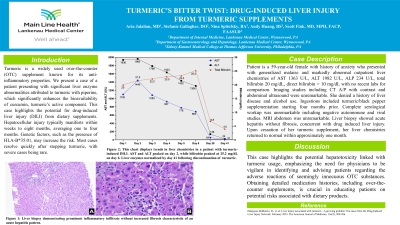Tuesday Poster Session
Category: Liver
P4723 - Turmeric's Bitter Twist: Drug-Induced Liver Injury from Turmeric Supplements
Tuesday, October 29, 2024
10:30 AM - 4:00 PM ET
Location: Exhibit Hall E

Has Audio

Aria Jalalian, MD
Lankenau Medical Center
Wynnewood, PA
Presenting Author(s)
Aria Jalalian, MD1, Stefanie Gallagher, DO1, Nina R. Spitofsky, BA2, Andy Huang, BS2, Scott Fink, MD1
1Lankenau Medical Center, Wynnewood, PA; 2Sidney Kimmel Medical College at Thomas Jefferson University, Philadelphia, PA
Introduction: Turmeric is a popular over-the-counter (OTC) supplement that holds anti-inflammatory properties. We present a case of a patient with markedly abnormal liver chemistries ultimately attributed to her turmeric supplement started months prior to presentation causing drug-induced liver injury (DILI). This case highlights the importance of recognizing the hepatotoxic potential of dietary supplements, such as turmeric with piperine (black pepper) which increases the bioavailability of curcumin, turmeric’s bioactive component. Liver injury is typically hepatocellular with onset occurring from weeks to up to eight months, averaging between one and four months. Furthermore, susceptibility to injury may be linked to a genetic predisposition, with individuals carrying HLA-B*35:01 exhibiting a higher likelihood of experiencing the disease. Most cases exhibit a self-limited course with rapid improvement upon discontinuing turmeric, and severe cases leading to death are rare.
Case Description/Methods: Patient is a 59-year-old female with history of anxiety who presented with generalized malaise and markedly abnormal outpatient liver chemistries of AST 1363 U/L, ALT 1982 U/L, ALP 234 U/L, total bilirubin 20 mg/dL, direct bilirubin > 10 mg/dL with no recent labs for comparison. Imaging studies including CT abdomen/pelvis with contrast and abdominal ultrasound were wholly unremarkable. She denied a history of liver disease and alcohol use. Ingestions included turmeric/black pepper supplementation starting four months prior. Complete serological workup was unremarkable including negative autoimmune and viral studies. MRI abdomen was unremarkable. Liver biopsy showed acute hepatitis without fibrosis, concurrent with viral disease or drug induced liver injury. Upon cessation of her turmeric supplement, her liver chemistries returned to normal within one month.
Discussion: This case highlights the potential hepatotoxicity linked with turmeric usage, emphasizing the need for physicians to be vigilant in identifying and advising patients regarding the adverse reactions of seemingly innocuous OTC substances. Obtaining detailed medication histories, including over-the-counter supplements, is crucial in educating patients on potential risks associated with dietary products.
Halegoua-DeMarzio, D., et. al. Liver injury associated with turmeric—A growing problem: Ten cases from the Drug-Induced Liver Injury Network. February 2023. The American Journal of Medicine, 136(2), 200-206.

Disclosures:
Aria Jalalian, MD1, Stefanie Gallagher, DO1, Nina R. Spitofsky, BA2, Andy Huang, BS2, Scott Fink, MD1. P4723 - Turmeric's Bitter Twist: Drug-Induced Liver Injury from Turmeric Supplements, ACG 2024 Annual Scientific Meeting Abstracts. Philadelphia, PA: American College of Gastroenterology.
1Lankenau Medical Center, Wynnewood, PA; 2Sidney Kimmel Medical College at Thomas Jefferson University, Philadelphia, PA
Introduction: Turmeric is a popular over-the-counter (OTC) supplement that holds anti-inflammatory properties. We present a case of a patient with markedly abnormal liver chemistries ultimately attributed to her turmeric supplement started months prior to presentation causing drug-induced liver injury (DILI). This case highlights the importance of recognizing the hepatotoxic potential of dietary supplements, such as turmeric with piperine (black pepper) which increases the bioavailability of curcumin, turmeric’s bioactive component. Liver injury is typically hepatocellular with onset occurring from weeks to up to eight months, averaging between one and four months. Furthermore, susceptibility to injury may be linked to a genetic predisposition, with individuals carrying HLA-B*35:01 exhibiting a higher likelihood of experiencing the disease. Most cases exhibit a self-limited course with rapid improvement upon discontinuing turmeric, and severe cases leading to death are rare.
Case Description/Methods: Patient is a 59-year-old female with history of anxiety who presented with generalized malaise and markedly abnormal outpatient liver chemistries of AST 1363 U/L, ALT 1982 U/L, ALP 234 U/L, total bilirubin 20 mg/dL, direct bilirubin > 10 mg/dL with no recent labs for comparison. Imaging studies including CT abdomen/pelvis with contrast and abdominal ultrasound were wholly unremarkable. She denied a history of liver disease and alcohol use. Ingestions included turmeric/black pepper supplementation starting four months prior. Complete serological workup was unremarkable including negative autoimmune and viral studies. MRI abdomen was unremarkable. Liver biopsy showed acute hepatitis without fibrosis, concurrent with viral disease or drug induced liver injury. Upon cessation of her turmeric supplement, her liver chemistries returned to normal within one month.
Discussion: This case highlights the potential hepatotoxicity linked with turmeric usage, emphasizing the need for physicians to be vigilant in identifying and advising patients regarding the adverse reactions of seemingly innocuous OTC substances. Obtaining detailed medication histories, including over-the-counter supplements, is crucial in educating patients on potential risks associated with dietary products.
Halegoua-DeMarzio, D., et. al. Liver injury associated with turmeric—A growing problem: Ten cases from the Drug-Induced Liver Injury Network. February 2023. The American Journal of Medicine, 136(2), 200-206.

Figure: Figure 1: Liver biopsy demonstrating prominent inflammatory infiltrate without increased fibrosis characteristic of an acute hepatitis pattern.
Disclosures:
Aria Jalalian indicated no relevant financial relationships.
Stefanie Gallagher indicated no relevant financial relationships.
Nina Spitofsky indicated no relevant financial relationships.
Andy Huang indicated no relevant financial relationships.
Scott Fink indicated no relevant financial relationships.
Aria Jalalian, MD1, Stefanie Gallagher, DO1, Nina R. Spitofsky, BA2, Andy Huang, BS2, Scott Fink, MD1. P4723 - Turmeric's Bitter Twist: Drug-Induced Liver Injury from Turmeric Supplements, ACG 2024 Annual Scientific Meeting Abstracts. Philadelphia, PA: American College of Gastroenterology.
